Photo

Revolutionary Road, dir Sam Mendes (2009)
This film depicts a curve, that of a couple confronted with the disillusionment of a life, the loss of their hopes, and their fantasies. Then, suddenly, in a flash, the crazy hope of living the life that they had imagined, in Paris, city of freedom, this life where everything is not an "hopeless emptiness", like the says Frank Wheeler played by the brilliant Leonardo Di caprio. Finally, comes the end of this short moment of dream, of fantasy returning to the surface, before finally plunge under the peaceful water of the lake. Back to this perfect life of a married couple, three children, in a beautiful suburb in the mid-1950s in the United States. The American dream. This film, of a rare intensity, depicts these different stages. These two ideals: the torpor of the norm against the quest for the absolute, the search for an intense life, extra ordinary, these are the words of April Wheeler, interpreted by the divine Kate Winslet. April and Frank embody yet this sublime couple, this couple of outsized beings promised to a great future. Yet the film confronts them with this sad truth: what if they had already reached the horizon of their future? If it was finished? If their life was no more than that: family life, torpor, common job for the father and life of a good mother at home? If that was their end? They live in the Revolutionary Road neighborhood, and yet nothing is revolutionary. They are confronting little by little to the painful descent into hell of the loss of their illusions. A world where the norm is this "hopeless emptiness" and where the madness is embodied by those who say aloud what they think, those who refuse to lower themselves to the normative constraints of society and who are electrocuted for it (the son of their owner). April is a free woman, a woman who vibrates inside, a woman who wants to escape. Her husband seems to have lost his ideals, the norm eventually seduce him, he is no longer the young man who spoke of living intensely and ardently. This magnificent final scene shows it well. April escapes into the forest, she is outside, far from any spatial constraint. He, Franck, is shut up in his house. Far from it and freedom. The window of the house creates overcrowding, enclosing it even more. The standard of the perfect family of the 50s stifles it. The norm of the American dream. He, too, ended up being a prisoner. And there is only she, April, who can not conform to it, never. The one who prefers to join death rather than live the life that we want to impose her.
This film is a beautiful lesson on the difficulty of conforming to one's dreams, the difficulty of knowing oneself, the difficulty of believing in what escapes the norm, the difficulty of flying, of being free to escape from the decent framework of society. The difficulty of loving oneself with time, when ideals fly away, when love turns into hatred and happiness into a heavy, shaven vacuum. When they become like everyone else, empty and desperate.
- Lune
#review#english#revolutionary road#kate winslet#sam mendes#Leonardo di caprio#words#analysis#couple#hopeless emptiness
16 notes
·
View notes
Photo

Revolutionary Road, dir Sam Mendes (2009)
Ce film dépeint une courbe, celle d'un couple confronté à la désillusion d'une vie, la perte de leurs espoirs, et de leurs fantasmes. Puis, soudainement, en un éclair, l'espoir fou de vivre la vie qu'ils s'étaient imaginés, à Paris, ville de la liberté, cette vie où tout n'est pas “qu'un vide désespérant”, comme le dit Frank Wheeler interprété par le brillant Leonardo Di caprio. Finalement, vient la fin de ce court instant de rêve, de fantasme revenant à la surface, avant de finalement replonger sous l'eau paisible du lac. Retour à cette vie parfaite d'un couple marié, trois enfants, dans une belle banlieue au milieu des années 50 aux Etats Unis. Le rêve américain. Ce film, d'une rare intensité, dépeint ces différentes étapes. Ces deux idéaux: la torpeur de la norme contre la quête de l'absolu, la quête d'une vie intense, extra ordinaire, tels sont les mots de April Wheeler, interprétée par la divine Kate Winslet. April et Frank incarnent pourtant ce couple sublime, ce couple d'êtres hors normes promis à un grand avenir. Pourtant, le film les confronte à cette triste vérité: et s'ils avaient déjà atteints l'horizon de leur avenir ? Si c'était fini ? Si leur vie n'était plus que cela: vie familiale, torpeur, boulot commun pour le père et vie de bonne mère au foyer ? Si c'était ça leur fin ? Ils vivent dans le quartier de la route révolutionnaire, et pourtant, rien ne l'est. Ils se confrontent peu à peu à la douloureuse descente aux enfers de la perte de leurs illusions. Un monde où la norme est ce “vide désespérant” et où la folie est incarnée par ceux qui disent tout haut ceux qu'ils pensent, ceux qui refusent de s'abaisser aux contraintes normatives de la société et qui sont électrocutés pour cela ( le fils de leur propriétaire). April est pourtant une femme libre, une femme qui vibre à l'intérieur, une femme qui désire s'évader. Son mari, lui semble avoir perdu ses idéaux, la norme finit par le séduire, il n'est plus ce jeune homme qui parlait de vivre intensément et ardemment. Cette magnifique scène finale le montre bien. April s'échappe dans la forêt, elle est au-dehors, loin de toute contrainte spatiale. Lui, Franck, est enfermé dans sa maison. Loin d'elle et de la liberté. La fenêtre de la maison crée un surcadrage, l'enfermant encore davantage. La norme de la famille parfaite des années 50 l'étouffe. La norme du rêve américain. Lui aussi, a fini par en être prisonnier. Et il n'y a qu'elle, April, qui ne peut pas s'y conformer, jamais. Celle qui préfère rejoindre la mort plutôt que de vivre la vie que l'on veut lui imposer.
Ce film est une belle leçon sur la difficulté de se conformer à ses rêves, la difficulté de se connaître soi-même, la difficulté de croire en ce qui s'échappe de la norme, la difficulté de s'envoler, d'être libre, de s'échapper du cadre bienséant de la société. La difficulté de s'aimer avec le temps, lorsque les idéaux s'envolent, lorsque l'amour se transforme en haine et le bonheur en vide pesant et rasant. Lorsqu'ils deviennent comme tout le monde, vides et désespérés.
- Lune.
2 notes
·
View notes
Photo




Roma, dir Alfonso Cuarón (2018)
empty places.
14 notes
·
View notes
Photo


Roma, dir Alfonso Cuarón (2018)
“ I like being dead.”
1 note
·
View note
Photo

Roma, Alfonso Cuarón. (2018)
Roma, un film sur une mémoire, celle d'un réalisateur. Un rêve proustien, le rêve de redonner vie au passé, au mexique des années 70, à la domestique de son enfance et à son enfance elle-même. Et cela, au coeur d'une photographie en noir et blanc sublime, et une esthétique hypnotique. La beauté du film se loge dans les détails, dans ces panoramiques, comme ces plans séquences qui embrassent le décor et les corps emprisonnés dans ce huis clos saisissant. Les sens sont soudainement en éveil, l'on ne peut que ressentir chaque plan comme s'il était vivant. Dans ce film, peu à peu, les hommes disparaissent pour laisser le devant de la scène aux femmes, à ces femmes marquantes dans la vie du réalisateur, comme cette domestique dont il fait l'éloge avec émotion. Si Cleo affirme aimer être morte, elle est plus que vivante lorsque la caméra de Cuaròn s'attarde sur elle, sur son visage, sur son histoire. Dans ce film, les femmes sont des femmes, avec leurs défauts et leurs imperfections. Elles ne sont pas des corps normés, des visages stéréotypés. Cuaròn entre dans leur intimité et les filme avec justesse, et authenticité. Un regard tourné sur son passé, sur les événements traumatisants des années 70, sur la vie agitée du Mexique. L'histoire du Mexique sous le prisme de la petite histoire, celle d'une domestique. L'antre domestique n'a jamais été aussi sublime, aussi esthétisé, d'une beauté inouïe. Les femmes, également, sont à l'honneur. Si elles finissent toujours seules, elles restent ensemble, soudées, elles sont les liens qui unissent les membres de cette petite famille. Femme domestique, femme employée, finissent seules ensemble, sans les hommes, mais unies. L'une affronte l'adversité d'un divorce, la fuite d'un mari, et la nécessité de s'occuper seule de ses quatre enfants. L'autre affronte une grossesse non désirée, un père envolé et la mort d'un bébé. Deux femmes plus fortes que les brutales vagues de la mer qui déferlent à la fin de ce chef d'oeuvre cinématographique. Un plaisir visuel et émotionnel, d'une rare intensité.
- Lune.
2 notes
·
View notes
Photo

Roma, Alfonso Cuarón (2018)
Roma, a movie about a memory, that of a director. As the dream of Proust , the dream to revive the past, the Mexico of the 70s, the maid of his childhood and his childhood itself. And that, in the heart of a sublime black-and-white photography, and a hypnotic aesthetic. The beauty of the film lodges in the details, in these panoramics, like these shots that embrace the scene and the bodies imprisoned in this claustrophobic atmosphere. The senses are suddenly awake, we can only feel each plan as if it were alive. Gradually, the men disappear to give the center of the stage to women, to these remarkable women in the life of the director, like this servant whom Cuarón praises. If Cleo claims to be dead, she is more than alive when the camera is on her face, on her story. In this film, women are women, with their flaws and imperfections. They are not normalized bodies, stereotyped faces. Cuarón films their intimacy with accuracy, and authenticity. A look turned on his past, on the traumatic events of the 70s, on the restless life of Mexico. The history of Mexico under the prism of the little story, that of a servant. The domestic lair has never been so sublime, so aesthetic, of unheard-of beauty. Women, too, are honored. Domestic woman, employed woman, end up alone, without men, but united. The first one faces a divorce, the flight of a husband, and the necessity to take care of her four children. The other affronts an undesirable pregnancy, a father flying away and the death of a baby. Two women stronger than the brutal waves of the sea at the end of this cinematic masterpiece. A visual and emotional pleasure, of a rare intensity.
- Lune.
3 notes
·
View notes
Photo
Thunder road, Jim Cummings (2018)
“ like a vision, she dances across the porch as the radio plays. “



100 notes
·
View notes
Photo
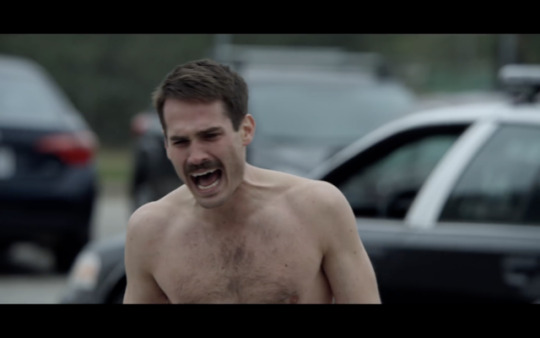
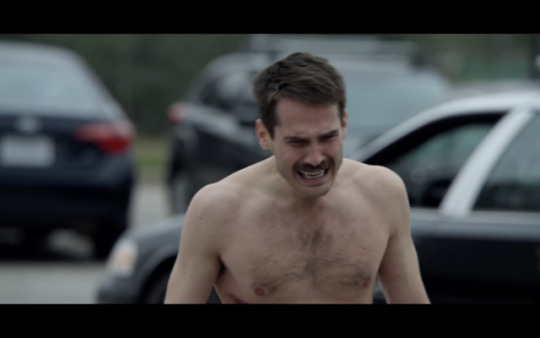

Thunder Road, Jim Cummings (2018)
“ my all family was there, it was beautiful ! “
1 note
·
View note
Photo

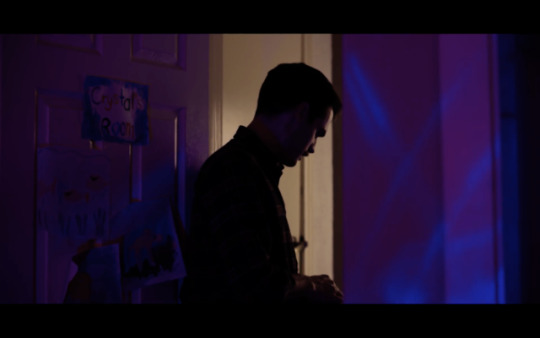


Thunder Road, dir Jim Cummings (2018)
“ Just because somebody chooses to leave, that doesn’t mean they didn’t wanna be here with you.
It means they had hard time of things.
A lot for some people.
That’s not gonna be us.”
19 notes
·
View notes
Photo

Thunder Road, Jim Cummings (2018)
“ So Mary, climb in
It’s a town full of losers, I’m pulling out of here to win ”
Between laughter and tears, Jim Cummings takes us to the heart of the descent into hell of a man, gradually losing everything meaningful in his life. A colorful character full of emotions, facing mourning and the loss of his last parent, loneliness, the difficulty of being a father, a fierce fight against divorce and the threat of exclusive custody of the mother. Everyone presents their own way of facing thunder on the road of life, and Jim Cummings confronts it tragically, as well as comically. In the darkest moments, Jim Cummings will make us laugh of the most terrible moments, while managing to break our heart. What a master stroke from this director, screenwriter and actor who plays and juggles with all palettes of emotions. We have never felt as alive, as human, as beautifully imperfect as by contemplating Thunder Road. Jim Cummings is so endearing in this role that it becomes impossible not to identify with him. The dance at the funeral of her mother, which can at first seem strange and offbeat, ends up becoming sublime, touching, hypnotizing, as the whole film.
- Lune
#thunder road#review#english#sublime#Jim cummings#masterpiece#cannes#Sundance#tragic#comic#aesthetic#visual#cinema#film#movie
8 notes
·
View notes
Photo

Thunder road, dir Jim Cummings (2018)
“ So Mary, climb in
It's a town full of losers, I'm pulling out of here to win ”
Entre rire et larmes, Jim Cummings nous emporte au coeur de la descente en enfer d’un homme, perdant peu à peu tout ce qui lui est cher. Un personnage haut en couleurs et en émotions, affrontant le deuil et la perte de son dernier parent, la solitude, la difficulté d’être un père, une lutte acharnée pour le demeurer face au divorce et la menace d’une garde exclusive de la mère. Chacun présente sa propre façon d’affronter le tonnerre sur la route de la vie, et Jim Cummings l’affronte tragiquement, tout autant que comiquement. Dans les moments les plus sombres, Jim Cummings parviendra à nous faire rire du plus terrible, tout en parvenant à nous briser le coeur. Coup de maître de ce réalisateur, scénariste et acteur qui joue et jongle entre toutes les palettes d’émotions. On ne s’est jamais senti aussi vivant, aussi humain, aussi magnifiquement imparfait qu’en achevant Thunder road. Jim Cummings est si attachant dans ce rôle qu’il en devient impossible de ne pas s’y identifier. La danse à l’enterrement de sa mère, qui peut tout d’abord sembler étrange et décalée, finit par en devenir sublime, touchante, hypnotisante, à l’image de l’ensemble du film.
- Lune.
1 note
·
View note
Text
Her, dir Spike Jonze.
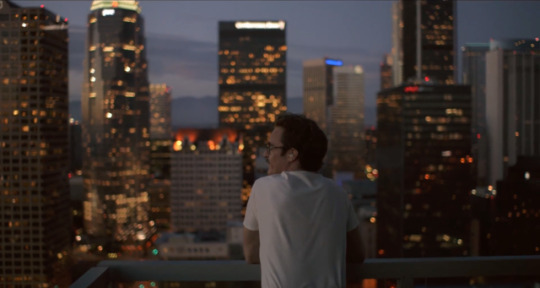
" I just wanted you to know, that there will always be a piece of me in you. "
7 notes
·
View notes
Text


Her, dir Spike Jonze.
" I'm just always confused. All I do is hurt and confuse everyone around me. "
2 notes
·
View notes
Text

Her, dir Spike Jonze.
" we are only here briefly, and in this moment I want to allow myself joy."
3 notes
·
View notes
Text
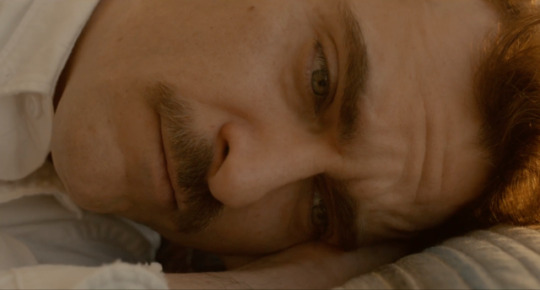

Her, dir Spike Jonze.
" Sometimes I think I've felt everything I'm ever gonna feel and from here on out I'm not going to feel anything new - just lesser versions of what I've already felt.”
5 notes
·
View notes
Text

Her, dir Spike Jonze.
" Falling in love is kind of like a form of socially acceptable insanity."
17 notes
·
View notes
Text

Her, Spike Jonze (2013)
her, a voice, a presence, a conscience. theodore falls in love. she is not human, she is only an artificial consciousness, nested in an indefinable place, beyond time or space. yet their feelings seem to transcend any physical or temporal law. the question of love is at the heart of this film, how to love, what is love, can we love beyond any carnal envelope? can one love the difference, even the most radical, in the other? because there seems to be no greater difference than a love between a man of flesh and a floating voice. a voice that, despite everything, tries to incarnate, desperately, in the image, in a body. a voice that tries to hide any difference with the beloved man. finally, their love will only be purer when this quest for being like the other will cease, when the affirmation of samantha's identity will grow, when she will claim to be a timeless being beyond matter. samantha ends up living by herself and no longer through the beloved man.
as for theodore, he also tries to live again through a voice, a fantasy love. alone, on the screen, in the middle of these immense buildings, in the heart of these empty rooms, in frames too big for him. little by little, he tries to fill a loneliness that gnaws him, he also tries to learn to love by difference. he tries to win back his wounded heart, an injured heart because of a past love that haunts his gaze, as well as the image of the film. he is so human, theodore, terrified at the idea of having felt everything, of having lived everything, terrified at the idea that everything is nothing more than a bland image, similar of a film fade, sinking little by little in the dark and leading the image to total nothingness. yet he learns to love too, to live again, thanks to the love of a voice that is embodied in the image more than any body could be. if this voice ends up leaving him, the image has never been as fulfilled as at the end of the film. he will never be alone again.
- Lune.
0 notes